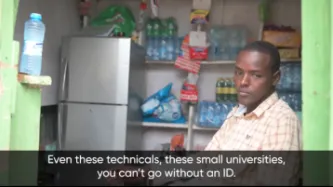Search
Content type: Long Read
We continue producing real change by challenging governments and corporations that use data and technology to exploit us.Though 2025 has been a tumultuous year, we’ve achieved some wins and we would like to share them with you.Creating real change is hard, and worthwhile changes takes time. We uncover problems, draw attention to them, and pressure for improvement. In the third quarter of the year, we helped ensure Clearview AI’s business falls under the GDPR; challenged facial recognition…
Content type: Video
It's our first time attempting a video podcast, so please let us know what you think by dropping us an email at [email protected]! Read more about our challenge against the UK's secret TCN powers.
Content type: Long Read
In 2024, Privacy International (PI) continued to produce real change by challenging governments and corporations that use data and technology to exploit us.Since the beginning of the year, we’ve achieved some wins and would like to share the most recent ones with you.Creating change is hard, and takes time. We have to uncover problems, draw attention to them, and pressure for change. In the latest quarter, we've been able to push regulators for stronger standards on generative AI systems, draw…
Content type: Long Read
What happened?On 19 July 2024, American cybersecurity company CrowdStrike released an update to its CrowdStrike Falcon software that ultimately caused 8.5 million computers running Microsoft Windows to crash. The damage done was both deep and wide: deep because the computers affected were unable to recover without direct user intervention. Wide because a whole range of companies - from airlines to healthcare to media - across a whole range of countries - from Sweden to India to New Zealand -…
Content type: Long Read
In 2023, Privacy International continues to produce real change by challenging governments and corporations that use data and technology to exploit us.Since the beginning of the year, we had some significant achievements we're proud of and want to share with you. Take a look below to see how we are changing the world for the better.SpringBetter EU regulation of digital products PI’s continuous advocacy around the Cyber Resilience Act resulted in further adjustment of the…
Content type: Long Read
In August 2021, PI published the report An unhealthy diet of targeted ads where we uncovered how personal data was shared by diet companies through their online ads and online testing. Our findings were quite grim, with highly sensitive personal data shared with third parties without consent.
Following this initial report, we performed follow-up research with the same methodology and by September 2021 we reported a number of positive changes from two of these websites: BetterMe and VShred.…
Content type: Long Read
Last update: 26 April 2023
In 2022, Privacy International continues to produce real change by challenging governments and corporations that use data and technology to exploit us.
We know life moves quickly. So, we wanted to keep you in the loop and ensure you don’t miss out on how we’re changing the world for the better.
That’s why we’ve created this highlight reel of our wins in the past year.
Take a look below!
PS: To continue to do this, and more, into 2023, we need your support. We…
Content type: Long Read
In the UK, successive government ministers and members of parliament have made emotive proclamations about the malaise of "public sector fraud".
This year, former Work and Pensions Secretary Therese Coffey said that the welfare system "is not a cash machine for callous criminals and it’s vital that the government ensures money is well spent...[and] fraud is an ever-present threat."
In 2013, the UK's minister for the disabled made numerous claims that there were "vast numbers of bogus disabled […
Content type: Video
In Kenya, if you don’t have an ID, life can be extremely difficult. But for thousands of people across the country, getting an ID can be nigh on impossible. Some Kenyan citizens can’t obtain a national ID because they are registered in the Kenyan refugee database. Often referred to as victims of double registration, their predicaments reveal a deeper problem with ID itself.Now Haki na Sheria - a Kenyan organisation advocating for and supporting the victims of double registration - and three…
Content type: Examples
After developing software that automatically recognises cookie banners that do not comply with the GDPR (usually because they do not provide a clear one-click option to reject all non-essential cookies), noyb has sent over 500 complaints to companies they consider non-compliant and given them a one-month grace period to change their practices. Along with the complaints, noyb provides a step-by-step guide on how to comply. They intend on generating over 10,000 complaints in this way in the…
Content type: Examples
The Irish Council for Civil Liberties (ICCL) has filed a lawsuit in Hamburg against three AdTech industry trade bodies including the Interactive Avertising Bureau (IAB). Members of the IAB include big tech companies (Google, Facebook, Amazon, Twitter...), data brokers (Equifax, Experian, Acxiom...) and advertising agencies (Groupm, Publicis, IPG...).
The lawsuit follows the filing in 2018 of complaints with the Irish Data Protection Commission (DPC) and UK Information Commissioner (ICO), which…
Content type: Examples
While traditional media sought to criminalize the widespread November 2020 protests in Peru following the Congressional ouster of President Vizcarra, witnesses disseminated videos and photographs of police abuse on social networks. In the fear and uncertainty, many myths also circulated. In Peru, citizens have the right to refuse to allow police to check their cellphones unless they have a court order; slowed or absent wireless connections may simply be due to overload; as public officials,…
Content type: Examples
In December 2020 Myanmar authorities began rolling out its $1.2 million "Safe City" system of 335 Huawei AI-equipped surveillance cameras in eight townships in the capital, Naypyidaw. The system, whose purpose was originally presented by the Myanmar government as fighting crime, automatically scans faces and vehicle licence plates in public places and alerts authorities to the presence of those on a wanted list. The Safe City plan calls for installing similar systems in Mandalay by mid-2021 and…
Content type: Examples
Hundreds of pages of Myanmar government budgets for the last two fiscal years obtained by the New York Times show that the Myanmar military who staged a coup in February 2021 had new and sophisticated tools at their disposal: Israeli-made, military-grade surveillance drones, European iPhone cracking devices, and US software that can hack into computers and extract their contents. Purchases of sensitive dual-use cybersecurity and defence technology continued during the five years in which the…
Content type: Examples
The internet, mobile, and social media shutdown in Myanmar left protesters vulnerable to rumours and at a disadvantage in organising opposition to the 2021 military coup. Coordination was done via phone, word of mouth, and the Bluetooth-based messaging app Bridgefy, which was downloaded more than 1 million times in Myanmar in the days after the coup. All plans include both online and offline contingency arrangements; a second disruptive possibility is intermittent interruptions and throttling…
Content type: Examples
The Belarusian government is using the "Kipod" facial recognition software developed by the local software company LLCC Synesis to track and identify dissidents. Synesis was previously sanctioned by the EU for providing authorities with an AI surveillance platform capable of tracking individuals. Kipod uses biometrics machine learning algorithms to analyse material. Synesis has denied that the technology could be used to identify protesters, but the Belarusian government decreed the…
Content type: Examples
In August 2020, controversial Belarusian president Alexander Lukashenko cut off most of the nation's access to the internet in hopes of disrupting the protests against the vote-rigging that saw him installed as president. Online news sites were left largely offline from election day onward, and demonstrators had to scramble to find wifi connections and working VPNs or proxies in order to share whatever news they could find. Protests therefore relied on popular bloggers on Telegram channels to…
Content type: Examples
Despite its indications of support for the pro-democracy protesters, in October 2020 the EU bought the Belarusian authorities 15 surveillance drones, raising concerns that the video equipment they carry would be used to identify and arrest individual pro-democracy protesters. The EU foreign service paid for them out of an €850,000 neighbourhood project handled by Latvia and Lithuania, and denied that they could be used to identify individuals. The drones were intended for use to patrol EU…
Content type: Examples
The 2020 Belarus protests were the largest in the country's history and brought an unprecedented crackdown, in which protesters nationwide were tortured and criminally prosecuted as a means of repressing peaceful assembly. A report finds that these cases became political as the government violated the presumption of innocence and meted out disproportionately harsh sentences. The report found no reports of disciplinary action taken against law enforcement officers who exceeded their authority by…
Content type: Examples
In 2019, interviews with Hong Kong protesters destroying smart lampposts revealed that many distrusted the government's claim that they would only take air quality measurements and help with traffic control, largely because of the comprehensive surveillance net the Chinese government was using to control and oppress the minority Uighur population in the Xinjiang region. As part of their response to this threat, the protesters wore masks, carried umbrellas, and travelled on foot, using online…
Content type: Examples
In 2019 Hong Kong protesters cut down 20 of the city's smart lampposts, which are streetlights equipped with sensors and cameras, in order to counter the threat that they were vectors for surveillance technologies such as facial and licence plate recognition. TickTack Technology, which provided the lampposts, terminated its contract with the Hong Kong government because of the property damage and threats to its employees. Protesters uploaded pictures of the lampposts' inner workings to Facebook…
Content type: Examples
During 2019, Hong Kong law enforcement authorities had access to AI facial recognition software provided by Sydney-based iOmniscient that can match faces and licence plates from video footage to police databases, but chief executive Carrie Lam's administration and police did not confirm whether they were using it to quash the pro-democracy protests. IOmniscient is also used to find lost children and manage traffic and has users in more than 50 countries. Under Hong Kong's privacy laws, members…
Content type: Examples
As police began treating every 2019 Hong Kong protest as an illegal assembly attracting sentences of up to ten years in jail, facial recognition offered increased risk of being on the streets, as protesters could be identified and arrested later even if they were in too large a crowd to be picked up at the time. By October, more than 2,000 people had been arrested, and countless others had been targeted with violence, doxxing, and online harassment. On the street, protesters began using…
Content type: Examples
Both protesters and police during the 2019 Hong Kong protests used technical tools including facial recognition to counter each other's tactics. Police tracked protest leaders online and sought to gain access to their phones on a set of Telegram channels. When police stopped wearing identification badges, protesters began to expose their identities online on another. The removal of identification badges has led many to suspect that surveillance techniques are being brought in from mainland…
Content type: Examples
UK police have used unmanned drones to monitor political protests for animal rights, by Extinction Rebellion, and against HS2, an extreme-right demonstration, and those held peacefully by Black Lives Matter, according to the campaign group Drone Watch. The Surrey, Cleveland, Staffordshire, Gloucestershire, and West Midlands forces all admitted to using drones at BLM events. Others admitting to using drones include Devon and Cornwall and Avon and Somerset.
https://www.theguardian.com/uk-news/…
Content type: Examples
A British freedom of information tribunal ruled that for national security reasons police in England and Wales may refuse to say whether they are using Stingrays, also known as IMSI-catchers, which are capable of tracking thousands of mobile phones and intercepting their calls, text messages, and other data. In 2016, the Bristol Cable found that police forces had bought hundreds of thousands of these devices disguised in public spending data by the acronym CCDC. Privacy International, which…
Content type: Examples
On November 9, 2020, after a year of escalating tensions, Peruvian president Martín Vizcarra was impeached on the grounds of "moral incapacity" by lawmakers threatened by his anti-corruption investigations and the policy reform he led. The street protests that followed all over the country were coordinated via Instagram, Twitter, WhatsApp, and TikTok (#MerinoNoMeRepresenta) by hundreds of newly-created small, decentralised organisations. The march on November 14 is thought to be the largest in…
Content type: Examples
US Customs and Border Protection Data show that the Department of Homeland Security deployed helicopters, airplanes, and drones over 15 cities, including New York City, Buffalo, Dayton OH, and Philadelphia, where demonstrators assembled to protest the killing of George Floyd and collected at least 270 hours of video surveillance footage. That deployment, which sparked a congressional inquiry, was only part of a nationwide operation that repurposed resources usually sent to the US border to find…










